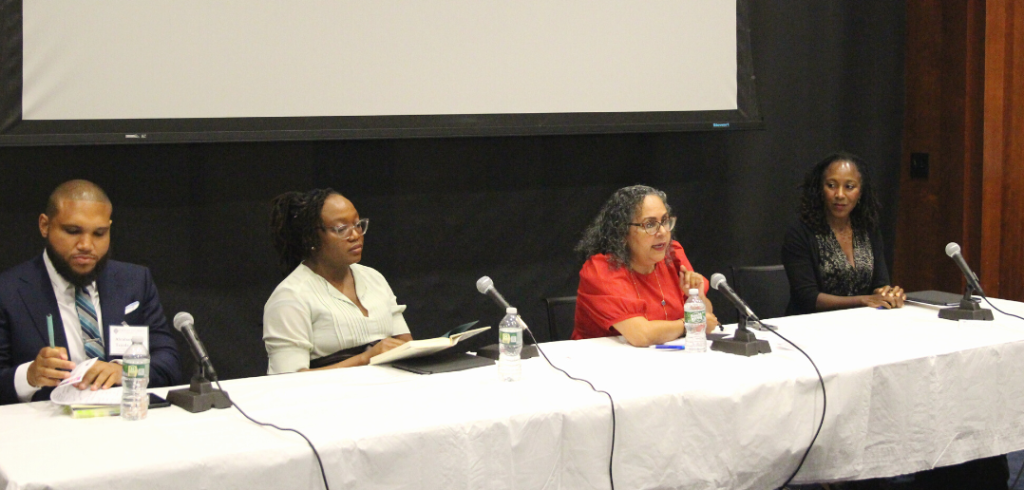Fordham Law celebrated the publication of Archibald R. Murray Professor of Law Tanya Hernández’s latest book, Racial Innocence: Unmasking Latino Anti-Black Bias and the Struggle for Equality, with a book talk event on September 15.
The event featured a panel discussion between Hernández and two other panelists, Juliet Mureriwa, a senior program officer at the Ford Foundation, and Abraham Tejeda, an associate human rights specialist for the New York City Commission on Human Rights, and was moderated by Professor Kimani Paul-Emile, who, along with Hernández, is an associate director at the Center on Race, Law and Justice at Fordham Law.
In the book, Hernández looks at the differences between race and ethnicity and examines the misconception that racism can’t exist within the Latino community, using a number of legal case studies to make her argument.
“The legal cases make concrete the dynamics of exclusion and, in turn, the way in which that denial [of racism]… also creeps into a misapplication of anti-discrimination law by judges,” Hernández said. “When judges believe this ‘pseudo-defense,’ they are under-enforcing anti-discrimination law because they’re letting Latinos off the hook.”
 Anti-Black Racism, Locally and Globally
Anti-Black Racism, Locally and Globally
During the panel discussion, Tejeda affirmed the importance of accurate data collection and census rules for understanding racial discrimination, citing his own experience at the City’s Commission on Human Rights. Despite the fact that racial discrimination is the second-most common type of discrimination reported in New York City, the data collected on discrimination does not include the race of the perpetrators or victims, Tejeda said. “That’s a conversation we need to have if we want to have a better measure of where the discrimination is happening, who it’s happening to, and who’s engaging in it.”
Mureriwa’s comments looked beyond the local and national context and explored the issue of anti-Blackness across the world, based on recent research done by the Ford Foundation.
“The research found incontrovertible evidence that, first of all, [anti-Blackness] is a global phenomenon,” said Mureriwa. “It reveals patterns of anti-Blackness…with material consequences.”
In Latin America, the report found many examples of discriminatory policies that undercounted or ignored the presence of people of African descent, said Mureriwa.
“Broadly for Latin America, anti-Blackness manifests itself in the legal denial or the whitening of the race, the erasure of Blackness, and the denial of the existence of Black citizens in almost every country in that region,” Mureriwa said.
Looking Ahead
It was no coincidence that the event took place on the first day of Latinx/e Heritage Month, said Hernández.
“Why are we launching Latinx/e Hispanic Heritage Month by talking about very deep, complex and taboo topics?” she said. “Because it’s needed. Not just as a space for healing for those who have been harmed by the anti-Blackness that exists within Latino communities, but also, from a legal perspective … judges need to understand this too.”
That way forward, Hernández said, must include a “real honest reckoning with the racism within Latino communities … and Latinx/e Hispanic Heritage Month should allocate space for doing so.”

